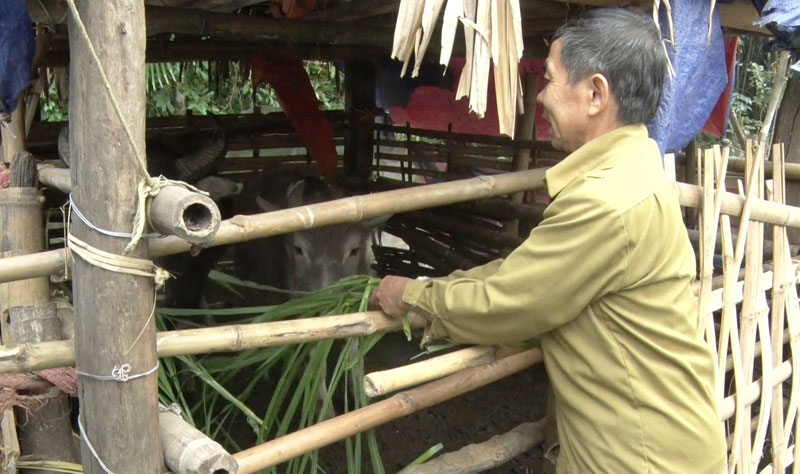
(HBO) – At the end of 2018, the rate of the poor households in the north-western mountainous province of Hoa Binh is estimated at 14.74 percent, down 3.1 percent year-on-year. The result has reflected the efficiency of preferential loans for the poor.
Xa
Van Hoan, a man of the Tay ethnic minority group in Phu Son hamlet, Cao Son
commune, Da Bac district said before accessing the loans, his family had been
in the list of especially poor households in the commune. In 2012, his family
was eligible to get a loan worth 20 million VND from a programme that supports
poor households and another loan worth 8 million VND from the Vietnam Bank for
Social Policies (VBSP)’ Da Bac district branch under a programme supporting ethnic
minority households in special difficulties. With the money borrowed, his
family bought two buffalos that gave birth to two calves after nearly one year.
In 2015 Hoan’s family paid back the due debt and borrowed another 30 million
VND to invest in animal husbandry. Currently, his family has five buffaloes.

With preferential loans from the VBSP,
poor households in Cao Son commune (Da Bac district) have invested in buffalo
breeding, gradually getting rid of poverty and stabilising their lives.
Hoan’s family is one of the more than 90,000 others in the province which have surpassed
the poverty line after 15 years since the preferential loans were offered in
the province.
As of late November, 9,582 households had accessed loans totaling over 303
billion VND, with more than 256 billion VND already paid back. Total loan
outstanding balance exceeded 922 billion VND, with 31,851 debtors.
Local Party committees and authorities need to pay more attention to vocational
training and agriculture and forestry expansion in order to optimise the preferential
loans, helping accelerate poverty reduction in the province.
The Department of Education and Training of Hoa Binh province held a conference on March 18 to review the performance of the "Safe and Happy School" Project and set out tasks for 2025. The project, funded by the Taiwan Fund for Children and Families (TFCF), aims to create a safe, inclusive, and supportive learning environment for students. The event saw the attendance of representatives from the TFCF and 26 beneficiary schools.
With over 70% of their workers being women, trade unions across industrial parks (IPs) in Hoa Binh have been actively safeguarding their legal rights and interests while implementing initiatives to improve their income and well-being.
In recent years, the Hoa Binh provincial General Hospital has continuously innovated itself and improved the quality of medical services to meet the increasing needs of local people. With substantial investments in infrastructure and modern equipment, along with a team of highly qualified doctors and nurses, the hospital has gradually established itself as one of the leading medical units in the Northwestern region and a trusted destination for healthcare for people inside and outside the province.
From mastering the fundamentals of programming to achieving national recognition, the Programming Club of the Le Van Tam Primary School (STAR LVT28) in Hoa Binh city has made remarkable strides in the field of robotics.
The Ho Chi Minh Communist Youth Union Committee and the Vietnam Youth Federation chapter of Hoa Binh province organised a programme on March 12 to launch the "Digital Literacy" movement and an online quiz on the resolutions of the Vietnam Youth Federation congresses at all levels, as well as the Politburo's Resolution No. 57-NQ/TW on breakthroughs in the development of science, technology, innovation, and national digital transformation.
As climate change grows more unpredictable, the development of production forests has become essential - not just for economic growth, but for safeguarding the environment and maintaining ecosystem balance. By boosting local incomes, curbing natural disasters, preventing soil erosion, and protecting water resources, these forests play a crucial role in sustainable development.



